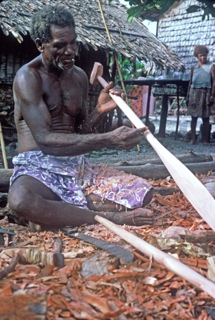Saltwater-Bush Competition Fishing the Passage
When Fanalei and Walande’s Lau ancestors discovered the sheltered Passage and claimed its rich reefs for their alata, it had been uncontested by Sa’a “bush” people. Bush culture focused on gardening in the hills arching up from the Passage. Hills also provided a degree of safety from Lau raids. The “saltwater” people were notorious fighters and took early advantage of mid-nineteenth century Blackbirders--colonial plantation labor traders carrying off people as far as Fiji and Australia--to earn guns and other “cargo”—manufactured goods--by delivering bush to the traders. Long after colonial government was firmly in place and Pax Britannica reigned--guns and payback fighting banned--the Lau gladly retained their fierce reputation. Even on the eve of Independence, the Lau were boasting of their prowess over the “bush” people who assiduously continued to avoid fishing inside the Passage.
During my first fieldtrip to Fanalei in 1973, I loved paddling across the Passage and snorkeling the shallow reefs, and never saw Sa’a fishing. An occasional bush relation came to join a Lau net-fishing team, but only the Lau were culturally organized for net-fishing around the alata. Besides, bush people still lacked even small dugout canoes for individual gill-netting, diving, or hook-and-line fishing inside the passage. When a bush clan needed fish for a feast, they came to ask the chief at Fanalei to send out a team to fish one of his alata for them. The bush clan that made the request was granted the largest share of the catch, with the rest of the catch divided among the net team. If they were affinally related to Fanalei--intermarriage being common—they could reciprocate with garden crops. Otherwise, they had to present the chief with a one fathom of red money, or porpoise teeth, or even cash as compensation.
 Around 1975, population pressure on garden land had reached a point where individual “bush” men were daring to venture into the passage for subsistence. This initiated the first marine resource competition between the Lau and Sa’a inside the Passage.
Around 1975, population pressure on garden land had reached a point where individual “bush” men were daring to venture into the passage for subsistence. This initiated the first marine resource competition between the Lau and Sa’a inside the Passage.
By the late 1970s, a few “bush” men were turning their trees into dugouts for their own use. Tension over Passage fishing rights marked the loss of Lau dominance. Terrible in Lau eyes, “bush” people along the Passage started pressing for official fishing rights in Custom Court that hears contested land/marine tenure cases. In Custom Court, clans can prove ownership by citing ramo fight stories.
Publically Lau have scorned the idea of ever being asked to pay compensation to bush clans for marine use. Pointing to their loss of power to control Passage waters with conflicting emotions, a few Lau tell me it signaled the coming of “Brotherhood taught by the Church”. Most Lau, however, felt “cross”--angry--that it was coming at such a steep cultural price saying, “Bush” people might stop fearing and respecting Lau warriors."
By the mid 1980s, bush fishing continued to escalate. I could compare the percentage of Sa’a versus Lau dugouts inside the Passage on any given Saturday--the day to secure fish for Sunday. Fanalei's Anglican Church forbids all work on Sundays, including spearfishing on picnics. So on calm weather Saturdays, Lau fishermen left the Passage far behind, ranging far to sea. More Sa’a than Lau fished inside the Passage on these Saturdays, emboldened on by their own numbers.
It reached the point where local politicians felt they could win votes by joining sides with the Sa’a bush majority. During the 1986 South Malaita Parliamentary elections, candidates campaigning in bush villages even promised that they would take back control of the Passage from the Lau and repatriate the Lau to North Malaita.
As population growth surged beyond the capacity of slash-and-burn agriculture in the fragile, thin-soiled, hilly rain forest on the mainland, land ownership and questions of rights to marine resources rose to the fore. Land-poor clans, whether bush or saltwater, were facing a tight subsistence situation, turning to the sea and cash. Population pressure was reflected in ever-increasing numbers of custom court cases contesting land and reef tenure.








